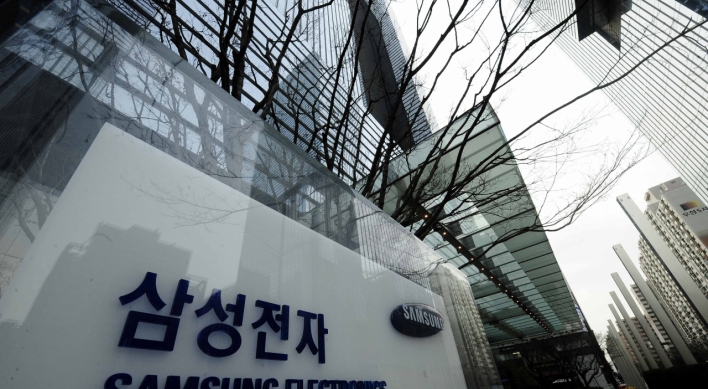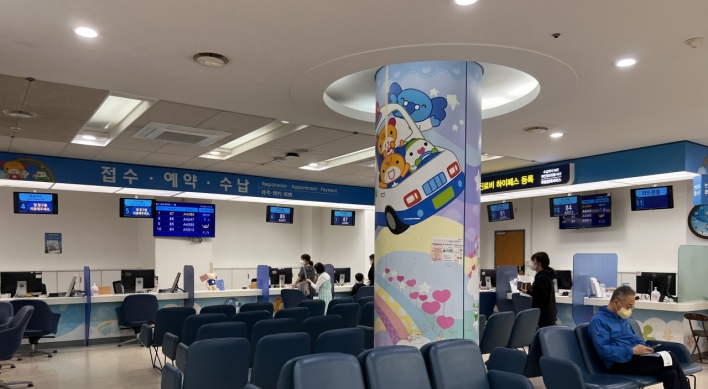A year in practice, Korea-China trade deal brings limited effect
By Korea HeraldPublished : Dec. 19, 2016 - 18:09
A free trade agreement between South Korea and China has brought fewer benefits than anticipated since it came into force a year ago.
But the pact has served as a bulwark against an otherwise steeper fall in bilateral commerce between the two countries. The decline comes against a backdrop of fraying diplomatic ties in recent months caused by South Korea’s moves to strengthen security cooperation with the US and Japan.

So far this year, South Korea’s exports to China have fallen by more than 9 percent from a year earlier but the shipment of goods subjected to reduced tariffs under the trade deal has decreased at a much slower pace of 1.7 percent, according to data from the Korea International Trade Association.
The accord obliges both sides to gradually scrap tariffs on more than 90 percent of products traded between them over the coming 20 years. China abolished duties on 958 items imported from South Korea upon the trade pact taking effect Dec. 20 last year.
In a recent survey of 605 South Korean companies exporting goods to China, conducted by the KITA, 65 percent of respondents said they were feeling the effect of tariff reductions.
Han Jae-jin, an analyst at the Hyundai Research Institute, said the deal between Seoul and Beijing would bring greater benefits to local exporters in the long term, while its immediate effect might be limited as its initial level of liberalization was relatively low.
South Korea relies on China, its largest trading partner, for more than a quarter of its exports, accounting for around 10 percent of imports into the world’s second-largest economy.
The country’s exports to China fell for the 16th consecutive month in October before posting a slight on-year increase of 0.4 percent in November.
It is far from assured, however, that this unexpected rebound, attributed mainly to a rise in the shipment of petrochemicals and machinery products, will lead to an upward trend in the months to come.
The effect of the bilateral trade accord may be offset by measures Beijing has taken to retaliate against Seoul’s agreement to deploy an advanced US missile defense battery here.
China has toughened regulation of South Korean pop-culture content and retail chains in its markets in addition to putting pressure on Chinese travel agencies to cancel tourist trips to South Korea.
What particularly unnerves South Korean exporters and trade officials is Beijing’s heightening of nontariff barriers on South Korean products.
Chinese authorities began a probe in September to decide whether to impose safeguards against refined sugar imported from South Korea. They also launched or reopened antidumping investigations on South Korean chemical goods in the following months.
In the first nine months of this year, South Korean food and cosmetics products failed to clear customs on 148 occasions, exceeding the number for the whole of last year at 130. The corresponding figure stood lower at 125 for the US, 116 for Japan and 113 for France.
“Consistent efforts should be made to reduce and eradicate nontariff barriers,” said Han.
South Korea’s exports to China are also expected to be hurt by trade conflicts between China and the US under the presidency of Donald Trump who has pledged to impose huge duties on cheap and heavily subsidized Chinese imports.
Additional US interest rate hikes, suggested by Federal Reserve policymakers last week, when the US central bank increased its benchmark rate for the second time in a year, are likely to deepen a slowdown in the Chinese economy, further dragging down the shipment of South Korean goods to China.
Many experts here say South Korea needs to make the best of the free trade accord with China not only to boost bilateral trade but also improve ties with Beijing.
They say South Korea needs to shift from a narrow approach focused on increasing exports to one that promotes mutual benefits from industrial cooperation.
“Trade policymakers should deepen contacts with Chinese counterparts to find win-win solutions to pending issues and corporate leaders have to use the free trade pact more strategically, such as through mergers with and acquisitions of complementary Chinese firms,” said Chung In-gyo, an economics professor at Inha University.
Chinese companies’ direct investment in South Korea increased by 8.5 percent from a year earlier to $1.66 billion in the first nine months of this year, suggesting they see a positive picture of bilateral economic partnership.
China’s exports to South Korea, which remained at $7.24 billion in December last year, increased to $8.09 billion in November.
A growing number of South Korean consumers, particularly those in their 20s and 30s, are turning to Chinese smartphones and other high-tech products, which they view as innovative and reasonably priced. They have also increasingly been drawn to China’s popular cultural content as proven by the fact that the viewing rate of a local cable TV channel specializing in Chinese dramas has jumped by 435 percent over the past five years.
Commentators here say China’s measures to backpedal on free trade principles will dampen this positive trend.
By Kim Kyung-ho (khkim@heraldcorp.com)
But the pact has served as a bulwark against an otherwise steeper fall in bilateral commerce between the two countries. The decline comes against a backdrop of fraying diplomatic ties in recent months caused by South Korea’s moves to strengthen security cooperation with the US and Japan.

So far this year, South Korea’s exports to China have fallen by more than 9 percent from a year earlier but the shipment of goods subjected to reduced tariffs under the trade deal has decreased at a much slower pace of 1.7 percent, according to data from the Korea International Trade Association.
The accord obliges both sides to gradually scrap tariffs on more than 90 percent of products traded between them over the coming 20 years. China abolished duties on 958 items imported from South Korea upon the trade pact taking effect Dec. 20 last year.
In a recent survey of 605 South Korean companies exporting goods to China, conducted by the KITA, 65 percent of respondents said they were feeling the effect of tariff reductions.
Han Jae-jin, an analyst at the Hyundai Research Institute, said the deal between Seoul and Beijing would bring greater benefits to local exporters in the long term, while its immediate effect might be limited as its initial level of liberalization was relatively low.
South Korea relies on China, its largest trading partner, for more than a quarter of its exports, accounting for around 10 percent of imports into the world’s second-largest economy.
The country’s exports to China fell for the 16th consecutive month in October before posting a slight on-year increase of 0.4 percent in November.
It is far from assured, however, that this unexpected rebound, attributed mainly to a rise in the shipment of petrochemicals and machinery products, will lead to an upward trend in the months to come.
The effect of the bilateral trade accord may be offset by measures Beijing has taken to retaliate against Seoul’s agreement to deploy an advanced US missile defense battery here.
China has toughened regulation of South Korean pop-culture content and retail chains in its markets in addition to putting pressure on Chinese travel agencies to cancel tourist trips to South Korea.
What particularly unnerves South Korean exporters and trade officials is Beijing’s heightening of nontariff barriers on South Korean products.
Chinese authorities began a probe in September to decide whether to impose safeguards against refined sugar imported from South Korea. They also launched or reopened antidumping investigations on South Korean chemical goods in the following months.
In the first nine months of this year, South Korean food and cosmetics products failed to clear customs on 148 occasions, exceeding the number for the whole of last year at 130. The corresponding figure stood lower at 125 for the US, 116 for Japan and 113 for France.
“Consistent efforts should be made to reduce and eradicate nontariff barriers,” said Han.
South Korea’s exports to China are also expected to be hurt by trade conflicts between China and the US under the presidency of Donald Trump who has pledged to impose huge duties on cheap and heavily subsidized Chinese imports.
Additional US interest rate hikes, suggested by Federal Reserve policymakers last week, when the US central bank increased its benchmark rate for the second time in a year, are likely to deepen a slowdown in the Chinese economy, further dragging down the shipment of South Korean goods to China.
Many experts here say South Korea needs to make the best of the free trade accord with China not only to boost bilateral trade but also improve ties with Beijing.
They say South Korea needs to shift from a narrow approach focused on increasing exports to one that promotes mutual benefits from industrial cooperation.
“Trade policymakers should deepen contacts with Chinese counterparts to find win-win solutions to pending issues and corporate leaders have to use the free trade pact more strategically, such as through mergers with and acquisitions of complementary Chinese firms,” said Chung In-gyo, an economics professor at Inha University.
Chinese companies’ direct investment in South Korea increased by 8.5 percent from a year earlier to $1.66 billion in the first nine months of this year, suggesting they see a positive picture of bilateral economic partnership.
China’s exports to South Korea, which remained at $7.24 billion in December last year, increased to $8.09 billion in November.
A growing number of South Korean consumers, particularly those in their 20s and 30s, are turning to Chinese smartphones and other high-tech products, which they view as innovative and reasonably priced. They have also increasingly been drawn to China’s popular cultural content as proven by the fact that the viewing rate of a local cable TV channel specializing in Chinese dramas has jumped by 435 percent over the past five years.
Commentators here say China’s measures to backpedal on free trade principles will dampen this positive trend.
By Kim Kyung-ho (khkim@heraldcorp.com)
-
Articles by Korea Herald


![[KH Explains] No more 'Michael' at Kakao Games](http://res.heraldm.com/phpwas/restmb_idxmake.php?idx=644&simg=/content/image/2024/04/28/20240428050183_0.jpg&u=20240428180321)



![[Grace Kao] Hybe vs. Ador: Inspiration, imitation and plagiarism](http://res.heraldm.com/phpwas/restmb_idxmake.php?idx=644&simg=/content/image/2024/04/28/20240428050220_0.jpg&u=)
![[Herald Interview] Mom’s Touch seeks to replicate success in Japan](http://res.heraldm.com/phpwas/restmb_idxmake.php?idx=644&simg=/content/image/2024/04/29/20240429050568_0.jpg&u=)


![[News Focus] Lee tells Yoon that he has governed without political dialogue](http://res.heraldm.com/phpwas/restmb_idxmake.php?idx=644&simg=/content/image/2024/04/29/20240429050696_0.jpg&u=20240429210658)








